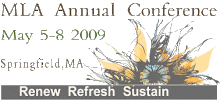How we got to where we are
Morgan reminded us that we have been using services (LC cards, OCLC, etc.) to help us build catalogs for generations and using the MARC record since 1965. It is a sequential specific data structure. Then, the invasion of Dialogue, CD-ROMS, network connections, and jump ahead to today, where Information structures, such as Google, are based on different indexing principles.
Redefine the definition of librarianship
Traditional core mission of librarianship is to collect, organize, archive, and disseminate data, information, and knowledge for our respective communities.
Here's what Morgan suggests:
Reduce dependence
Exploit technology
Morgan advocates using relational databases, indexing systems (Googlebox, Keynote Search, etc.), XML.
If we want to communicate to other places, in other words beyond the library community, we must speak other languages, and XML is the language being used.
As a "step in the right direction", conversion programs can help change MARC to MARC XML. The idea of describing a work is valid, but the method does not work in the broader world. The "Secret Codebook", better known as MARC, is limited because you need the code to interpret the fields.
A word from the audience (Dodie Gaudet) mentioned that the tags in XML are now in English, but MARC using numbers is more universal.
Commercial products use indexers to create interface. For example: Koha uses Zebra; Aqua developed a proprietary Indexer.
Work collaboratively
Work with peers and stakeholders in the inside and outside the library world.
"Next generation" library catalogs
Provide service not just catalog systems. As a part of the community, use this base to create services at the local level. Add, annotate, cite, compare and contrast, plot a map, find similar, trace authors, etc.
In response to a question, Morgan suggested see the applications (Scriblio, WordPress, VuFind, etc.) demonstrated during the pre-conference (MLA May 6th).

No comments:
Post a Comment